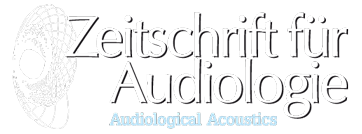Sprachtests im Online-Experiment am Beispiel des Oldenburger Satztests
Speech tests in online experiments using the example of the Oldenburg sentence test
Anne Schlüter1, Elisabeth-Sophie Baumann1, Fatma Ben Ghorbal1, Nele Hauenschild1, Alina Kleinow1, Vanessa Mazur1, Julia Thomas1, Inga Holube1
1Institut für Hörtechnik und Audiologie, Jade Hochschule, Oldenburg
Zusammenfassung: Während der COVID-19-Pandemie waren audiologische Untersuchungen im Labor nur unter sehr strengen Hygienemaßnahmen bzw. gar nicht möglich. Um dieses Hindernis zu umgehen, wurde ein Online-Experiment mit dem synthetischen Sprachmaterial des Oldenburger Satztests (OLSA) implementiert. Dadurch sollte geprüft werden, ob online mit synthetischer Sprache vergleichbare Ergebnisse erzielt werden wie in einem vorhergehenden Experiment im Labor. Mithilfe der Plattform Gorilla (https://gorilla.sc/) wurde ein Online-Experiment erstellt und durch einen Link über verschiedene Kommunikationskanäle (z. B. in Social Media) weitergegeben. Aufgerufen wurde dieser Link 182-mal, was zu 81 vollständigen Datensätzen führte. Die ermittelten Sprachverständlichkeitsschwellen von 69 Probanden sind vergleichbar mit den Ergebnissen aus der Laborsituation. Allerdings wichen die Steigungen der Diskriminationsfunktionen signifikant voneinander ab. Grundsätzlich konnte gezeigt werden, dass der synthetische OLSA auch als Online-Experiment durchführbar ist. Hürden im Vergleich zur Labormessung zeigten sich jedoch bei Rekrutierung und Motivation der Probanden.
Stichwörter: OLSA, Online-Experiment, SRT, synthetische Sprache
Abstract: During the COVID-19 pandemic, audiological tests in the laboratory were only possible under very strict hygiene measures or not at all. To circumvent this obstacle, an online experiment was implemented using the synthetic speech material of the Oldenburg Sentence Test (OLSA). The aim was to test whether comparable results could be achieved online with synthetic speech as used in a previous experiment in the laboratory. With the help of the platform Gorilla (https://gorilla.sc/), an online experiment was created and shared through a link via various communication channels (e.g., in social media). This link was accessed 182 times, resulting in 81 complete data sets. The speech-recognition thresholds established for 69 participants were comparable to the results from the laboratory situation. However, the slopes of the discrimination functions differed significantly. In principle, it was shown that the synthetic OLSA is also feasible as an online experiment. Compared to the laboratory measurement, greater hurdles were encountered in the recruitment and motivation of the test participants.
Keywords: OLSA, online experiment, SRT, synthetic speech
Erstveröffentlichung in GMS Z Audiol (Audiol Acoust) 2024;6:Doc05. DOI: 10.3205/zaud000040
